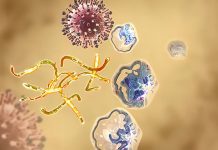
A new study has found an association between exposure to nitrites and nitrates in food additives and the risk of type 2 diabetes.
Nitrites and nitrates occur naturally in water and soil and are commonly ingested via water and dietary sources. They are also commonly used as food additives to increase a product’s shelf life. Many public health authorities have suggested limitations on the use of nitrites and nitrates as food additives. However, the relationship between dietary nitrites and nitrates in metabolic dysfunction and type 2 diabetes in humans has never been fully explored.
In order to better understand this relationship between, researchers from the Nutritional Epidemiology Research Team of Inserm and Sorbonne Paris Nord University examined data collected from 104,168 participants in the prospective cohort NutriNet-Santé.
The NutriNet-Santé study is an ongoing, web-based cohort study launched in 2009. Participants aged 15 and over enrolled voluntarily and agreed to self-report medical history, sociodemographics, diet, lifestyle, and major health updates.
Nitrites are more harmful than nitrates
The researchers studied nitrite/nitrate exposure, derived from several databases and sources, and developed statistical models to analyse self-reported diet information with health outcomes.
The researchers discovered that participants who reported a higher intake of nitrites overall and specifically from food additives, and non-additive sources had an increased risk of developing type 2 diabetes.
No association between nitrates and type 2 diabetes risk was found by the researchers, and the findings did not support any potential benefits for dietary nitrites or nitrates in terms of protection against type 2 diabetes.
Limitations of the study
The research team acknowledge that the study had several limitations and additional research is required to further validate the results. The data were self-reported by participants, and the researchers were unable to confirm specific nitrite and nitrate exposure using biomarkers due to the underlying biological challenges.
Additionally, results from the cohort may not be generalisable due to differences in demographics and behaviours. The study included a significant number of young individuals, more often women, who demonstrated many healthy behaviours. The researchers also say that residual confounding may also have impacted the outcomes as a result of the study’s observational design.
“These results provide a new piece of evidence in the context of current discussions regarding the need for a reduction of nitrite food additives’ use in processed meats by the food industry and could support the need for better regulation of soil contamination by fertilisers. In the meantime, several public health authorities worldwide already recommend citizens to limit their consumption of foods containing controversial additives, including sodium nitrite,” wrote the authors.
“This is the first large-scale cohort study to suggest a direct association between additives-originated nitrites and type 2 diabetes risk. It also corroborates previously suggested associations between total dietary nitrites and type 2 diabetes risk,” they added.
The full findings of the study have been published in the open-access journal PLOS Medicine
























